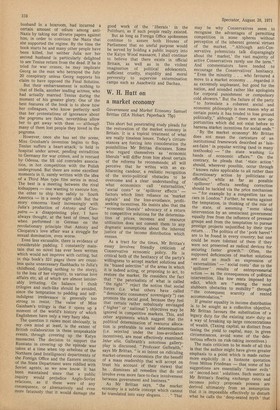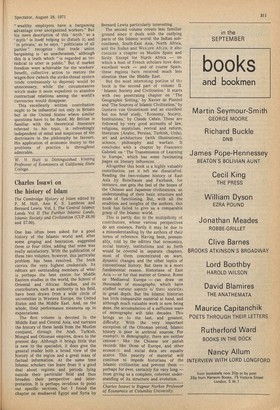W. H. Hutt on a market economy
Government and Marlzet Economy Samuel Brittan (IEA Hobart Paperback 75p) This short but penetrating study pleads for the restoration of the market economy in Britain. It is a topical treatment of what are really timeless issues. Today's circumstances are forcing into consideration the possibilities Mr Brittan discusses. Some who regard themselves as 'economic liberals ' will differ from him about certain of the reforms he recommends; all will perceive that he writes with an exhilarating candour, a realistic recognition of the socio-political obstacles to be overcome and a clear understanding of what economists call ' externalities,' ' social costs' or spillover effects' — factors which limit reliance on 'market signals' and the loss-avoidance, profitseeking incentives. He insists also that the ' economic liberals" advocacy of a return to competitive solutions for the determination of prices, incomes and resource utilization does not commit them to any dogmatic assumptions about the inherent justice of the income distribution which ensues.
As a tract for the times, Mr Brittan's essay involves friendly criticism of Conservative economic policy. He is critical both of the hesitancy of the party's willingness to accept market solutions and its 'biased selection' of the areas in which it is indeed acting, or proposing to act, to restore the market. He considers the fact that "the paternalists of what is called 'the right' " reject the notion that social forces (i.e. what others have called "democratic consumers' sovereignty ") can promote the social good, because they feel that certain rather nebulously envisaged (' higher ' or ' national ') objectives may be ignored in competitive markets. This, and other arguments which suggest that the political determination of resource allocation is preferable to social determination (i.e. selected under the loss-avoidance incentives), are most effectively examined. Inter alio, Galbraith's notorious galleryplay is discussed. " Professor Galbraith," says Mr Brittan, " is so intent on ridiculing market-oriented economists (for the benefit of a mass readership that will accept on trust his account of their views) that he... dismisses all remedies that do not involve even more face-to-face involvement between government and business."
As Mr Brittan says, "the market economy is a subtle concept which cannot be translated into easy slogans. . . . " That may be why Conservatives seem to recognise the advantages of permitting competition in some spheres without perception of the inherent general virtues of the market. "Although anti-Con servative polemicists talk disparagingly about the market,' the vast majority of active Conservatives rarely use the term."
And commentators have tended to encourage the Conservatives' hesitancy. "Even the minority . . . who favoured a move to a market economy . . .regarded it as extremely unpleasant, but good for the nation, and sounded rather like apologists for corporal punishment or compulsory cold showers." But the failure of the party " to formulate a coherent social and economic philosophy is one reason why at certain points it has tended to lose ground politically," although "there are now opportunities which did not exist before to harness market incentives for social ends." 'By the market economy' Mr Brittan does not mean the caricature of an institutional framework described as ' laissez-faire ' in popular writing (and in many textbooks) — "the state washing its hands of economic affairs." On the contrary, he pleads that state action' should, wherever possible, occur through "known rules applicable to all rather than discretionary action by politicians or officials;" while as far as possible ' spillover ' effects needing correction should be tackled via the price mechanism — "for example by a congestion tax on cars in London." Further, he warns against the temptation, in thinking of the role of the state, of assuming "some ideal intervention by an omniscient government equally free from the influence of pressure groups and from the temptation to pursue prestige projects unjustified by their true return.... The politics of the 'pork barrel' are to be found in every country; but one could be more tolerant of them if they were not presented as radical devices for securing faster growth." Often, the supposed deficiencies of market solutions are not so much an expression of externalities ' — 'social costs' due to the ' spillover ' results of entrepreneurial action — as the consequences of political intervention, like low rents imposed by edict, which are "among the most stubborn obstacles to mobility" through "the consequent scarcity of rented accommodation."
If greater equality in income distribution is to be sought as a collective objective, Mr Brittan favours the substitution of a legacy duty for the existing state duty as a way of breaking up large concentrations of wealth. (Taxing capital, as distinct from taxing the yield to capital, may, in given circumstances, avoid some of the deleterious effects on risk-taking incentives.)
The main criticism to be made of all this is that the author might have given greater emphasis to a point which is made rather more explicitly in a footnote quotation from Milton Friedman — that some of his
suggestions are essentially 'lesser evils ' or ' second-best ' solutions. Such merits as Mr Brittan's floating exchange rates and incomes policy proposals possess are derived ultimately from an assumption that it is impossible effectively to disturb what he calls the deep-seated myth 'that "wealthy employers have a bargaining advantage over unorganized workers." But his mere description of this ' myth ' as a ' myth ' is itself helping to disturb it; and in private,' as he says, " politicians of all parties " recognize that trade union bargaining is an anachronism,' although this is a truth which "is regarded as too radical to utter in public." But if market freedom were achievable for the workers' benefit, collective action to restore the wages-flow (which the strike-threat system tends continuously to depress) would be unnecessary, while the circumstances which make it seem expedient to abandon contractual relations among the world's currencies would disappear.
This excellently written contribution ought to be influential not only in Britain but in the United States where similar questions have to be faced. Mr Brittan is familiar with the theoretical literature relevant to his topic, is refreshingly independent of mind and suspicious of the doctrinaire in the philosophy he favours. His application of economic theory to the problems of practice is throughout admirable.
W. H. Hutt is Distinguished Visiting Professor of Economics at California State College.



































 Previous page
Previous page